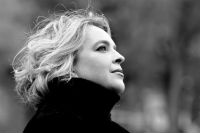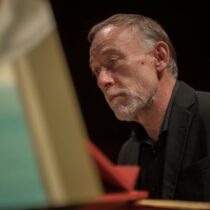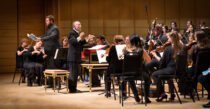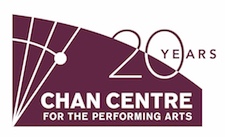Chan Shun Concert Hall at the Chan Centre for the Performing Arts | Map
Karina Gauvin, soprano; Alexander Weimann, music director; Pacific Baroque Orchestra
At the turn of the 18th century, Tsar Peter I “The Great” began to drag Russia, often kicking and screaming, toward the rest of Europe. His new capital, St. Petersburg, was to be a window to the West, and to that end, Peter imported Germans, Czechs, Italians, and others in his quest to modernize and ultimately “civilize” his native land. Peter and his successors, especially Anna Ivanovna, Elizabeth, and Catherine the Great, saw the opera house as an opportunity to show off their cultural wealth as a modern European nation. Join one of the world’s reigning sopranos in Baroque and classical repertoire, Karina Gauvin, for a programme of virtuosic opera arias from 18th century St. Petersburg.
“Over the last decade Karina Gauvin has proved herself one of the most delightful of Baroque sopranos. Her pellucid tone is now flecked with deeper, richer colourings, and precise, nimble coloratura” – Gramophone Magazine
Supported by Helen & Frank Elfert
Programme – Opera at the Crossroads – East Meets West in St. Petersburg
Yevstegniy Ipatievich Fomin (1761-1800)
From “The Coachmen” (1787):
Ouverture (Allegro) 4′
Dmitri Stepanovich Bortniansky (1751-1825)
From “Alcide” (1778):
Aria “Mi sorprende”
Dmitri Stepanovich Bortniansky
From “Alcide”:
Ballo di Geni , Acc. “In qual mar” & Aria “Dei clementi”
Dmitri Stepanovich Bortniansky
From “Le Faucon” (1786):
Ouverture (Allegro spiritoso), Airs d’Elvire “Ne me parlez”, “Pour toi l’amour”’
*********INTERMISSION*********
Domenico dall’Oglio (c. 1700-1764)
From “Cossaca”:
Sinfonia (Allegro, Andante, Presto)
Francesco Araja (1709-1770)
From “La Forza dell’Amore” (1736):
Aria “Colle procelle”, Sinfonia (Andante ma non Presto), Aria “Amico Tiranno”,
Sinfonia (Allegro), Aria “Scherza la pastorella”
Maxim Sozontovich Berezovsky (1745-1777)
From “Demofoonte” (1773):
Aria “Mentre il cor”, Violin sonata in C major (Grave), Aria “Misero pargoletto”
Programme Notes
In 1726, Johann Sebastian Bach wrote to his school friend Georg Erdmann, Consul of Danzig to Empress Catherine I, asking about a possible position at the Russian court. Catherine’s husband Peter the Great had been famous for his love of music, singing in the choir of his court chapel, and regularly visiting the homes of his court singers. Enamored with German culture, he established a tradition of staffing the court orchestra with German musicians that would last for the next 200 years. Tsar Peter had also developed his dominion into a major European power and led a controversial cultural revolution that set Russia on a path of secularization, urbanization, and westernization. His successors, Empresses Anna, Elizaveta, and Catherine II, continued this program, and cultivated cosmopolitan musical tastes, including opera. The court music of eighteenth-century Russia has been viewed with contempt because of contemporary imperial corruption and charged with being nothing but a mélange of foreign copying lacking any Russian national authenticity. Recent scholarship, however, has uncovered a vivid history of excellent music and musicianship by both native and international composers and performers.
Although Bach’s aspirations to join the Russian court never materialized, one of his students, Jacob von Stählin-Storcksburg, moved to St. Petersburg in 1735, becoming a Russian statesman and professor. He was the author of the first musical history of Russia and the music correspondent for the newspaper, St Petersburg Vedomosti, writing a column that promoted opera. At first, he had to explain the arguably preposterous idea of sung theatre and even the simultaneous use of voices and instruments, since in the predominantly sacred music of the court chapel, instruments were forbidden. “…The opera is a theatrical performance of the kind, which is represented by singing people, and in it not only the ear, by the constant interplay of vocal and instrumental music, but also the eye is delighted by ingenious staging using machines,” and, he asserted, “The passionate expression of speech finds the utmost perfection with the help of music.” Neapolitan composer Francesco Araja (1709-1770) joined the Russian court in the same year as Stählin along with a troupe including at least five outstanding Italian singers, eleven comedians, dancers, painters, opera producers, and set builders. There, in 1736 he mounted one of his recent Italian operatic successes, La forza dell’amore e dell’odio, the first opera to have its libretto translated into Russian. Two years later, Empress Anna invited him to create the School for Court Singers, the first Russian institution for the training of professional musicians. For almost twenty years, he continued to produce operas for state occasions, even bringing the famed castrato Farinelli to St. Petersburg for the coronation of Empress Elizaveta.
Meanwhile, other musicians like virtuoso violinist Domenico Dall’Oglio (1700-1764) supplied Italian instrumental music for weekly court concerts. Becoming increasingly interested in local musical traditions, they borrowed themes from Slavic music to incorporate into Italianate forms, as in Sinfonia Cossaca. Finally, in 1755, perhaps inspired by these efforts, Empress Elizaveta commissioned Araja to compose the first opera setting a Russian libretto. Araja needed the libretto explained to him word by word, but the opera was a success, Stählin remarking on Russian’s suitability for singing because of its softness, many vowels, and euphony, a fact certainly born out by the flourishing of Russian opera in the nineteenth century.
The Ukraine was famous for its musical traditions, including the choir school in Hlukhiv, where Maksym Sozontovych Berezovsky (1745-1777) and Dmytro Stepanovych Bortnyansky (1751-1825) received their early musical education. “Everything sings, plays, and dances in this land. The most widespread instrument is the bandura, with which skillful Ukrainians play the finest Polish and Ukrainian dances and accompany their numerous and quite gentle songs,” wrote Stählin. Both Berezovsky and Bortnyansky were recruited to the imperial court chapel and played major operatic roles while still boys, and both received imperial support to travel to Italy to study, Bortniansky with former Russian court composer Baldassare Galuppi in Venice, and Berezovsky with Padre Martini in Bologna. Their travels coincided with the Russian-Turkish war. Recently, a government form completed by Bortnyansky came to light, which indicates that their trips may not have been solely for musical purposes. “[I] did not take part in any battles, but during the advancement of the fleet in the Archipelago, was often used by its Commander-in-Chief Count Orlov, then in Venice, for negotiations…” Bortnyansky wrote. Berezovsky’s Demofoonte, perhaps commissioned by Count Orlov, premiered in 1773 in Livorno while the Russian troops were stationed there. Unfortunately, only four arias from the opera survive, but the Livorno gazette reported that it was “a musical opera of remarkable quality, combining liveliness and good taste with a mastery of musical science.” In 1778, Bortniansky’s Alcide also premiered in Italy, and shows him to have become a master of the latest operatic techniques, including carefully planned tonal structure, and colourful use of harmony and orchestration. Major operatic success in Italy signaled the completion of their studies, and each composer soon received a letter recalling them to Russia.
Berezovsky’s story is a tragic one, for he died penniless only four years after his return to Russia. Rumors suggested that he had committed suicide after being passed over for promotion, and a fictional history styling him a Romantic hero, victim of cruel fate and imperial corruption grew up, resulting in a drama, a novel, and a film about his life. Bortniansky, returning to a position as Director of Ecclesiastical Music, was soon also appointed as kapellmeister to the crown prince, Grand Duke Pavel Petrovich for whom he composed the French comic opera Le Faucon. Russian nobles received training in the performing arts as part of the curriculum of the Smolny Institute for Noble Maidens and the Cadet Corps for Nobles, and Grand Duke Pavel regularly invited his friends to present amateur theatre. Prince Dolgoruky, a regular participant in these events writes, “I was taught how to sing by Mr. Bortniansky, who produced our operas, and the mention of his name brings back the great pleasure of our many rehearsals… He was an easy-going, pleasant, affable artist and his tutelage soon transformed me into a good opera performer. Without any previous musical training or knowledge, I was memorizing my part and singing quite complicated scenes in pace with the orchestra and my colleagues.” Apparently, he learned by rote, because he also admits that the Grand Duchess caught him pretending to sing from upside-down music! Bortniansky must have been an exceptionally fine pedagogue. He went on to direct the imperial court chapel, which he enlarged to include 108 singers, whom he taught to perform not only his own music for the Orthodox liturgy, but an international reperotire including Haydn’s Creation, Mozart’s Requiem, and Handel’s Messiah.
The salon of Nikolai Alexandrovich Lvov attracted the brightest Russian intelligentsia, and it was likely he who recognized the potential of another Italian-trained Slavic composer, Yevstigney Ipat’yevich Fomin (1761-1800), encouraging his friend Derzhavin, governer of Tambov, to commission the Russian opera The Coachmen at the Relay Station for a visit of Empress Catherine the Great in 1786. The opera was to include a folk ensemble and folk choir performing Russian folksongs from Lvov’s collection, and a guest appearance by the empress herself to resolve the story. Unfortunately, the empress’s travel plans changed, but the opera’s score survives, foreshadowing the way nineteenth-century Russian composers would make this cosmopolitan genre their own by marrying it with Russian national elements. But, it was in the eighteenth century that Russia caught opera fever, as the historian V. Mikhnevich underscores in a humorous anecdote about his cousin Count Skavronsky, “…he ordered his attendant to speak to him in recitative, according to exact pitch. His footman, trained according to a score written by his master, would announce the carriage’s readiness in a pleasant alto. The head waiter would call out in a festive tune. The coachman would communicate with the Count in basso profundo. During festive lunches and receptions, all the servants were organized in duets, quartets and choirs, imparting the atmosphere of an opera house. His Highness himself gave instructions to his servants in musical form, singing his orders.”
Thanks to Henry Lebedinsky for his help with researching and sourcing music for this programme.
Thanks also to scholars Marina Ritzarev, author of the main English language book about this repertoire, Eighteenth-Century Russian Music (Routledge, 2006), and Lorenz Erren, editor of Musik am russischen Hof (De Gruyter, 2017).
Texts and Translations
To view/download the texts and translations for this concert, click here.

Karina Gauvin, soprano
Recognized for her work in the baroque repertoire, Canadian soprano Karina Gauvin sings Bach, Mahler, Britten and the music of the 20th and 21st centuries with equal success. The prestigious distinctions she has received include the title of “Soloist of the Year” awarded by the Communauté internationale des radios publiques de langue française, first prize in the CBC Radio competition for young performers, and the Virginia Parker Prize and Maggie Teyte Memorial Prize in London.
She has sung with the greatest symphony orchestras, including the Orchestre symphonique de Montréal, the San Francisco Symphony, the Chicago Symphony, the New York Philharmonic and the Rotterdam Philharmonic, as well as baroque orchestras such as Les Talens Lyriques, the Venice Baroque Orchestra, Accademia Bizantina, Il Complesso Barocco, the Akademie Für Alte Musik Berlin, the Tafelmusik Baroque Orchestra, and Les Violons du Roy. She has performed under the direction of Charles Dutoit, Michael Tilson Thomas, Bernard Labadie, Christophe Rousset, Alan Curtis, Sir Roger Norrington, Kent Nagano, Semyon Bychkov, Helmut Rilling and Yannick Nézet-Séguin. In addition, she has given recitals with pianists Marc-André Hamelin, Angela Hewitt, Michael McMahon, and Roger Vignoles.
She was Alcina (Handel) with Les Talens Lyriques and Ariadne in Georg Conradi’s Die Schöne und getreue Ariadne for the Boston Early Music Festival. She has sung Seleuce in Handel’s Tolomeo with Alan Curtis, with whom she also recorded Handel operas on ARCHIV/Deutsche Grammophon, Virgin and Naïve labels, among others. She performed in Tito Manlio (Vivaldi) in Brussels and at the Barbican in London, in Ezio (Handel) in Paris and Vienna, in Giulio Cesare (Handel) in Paris and Vienna, as well as in Juditha Triumphans (Vivaldi) with Andrea Marcon at the Concertgebouw in Amsterdam. Her performances with the Boston Early Music Festival Orchestra earned her nominations at the Grammy Awards in 2007 and 2009.
Karina Gauvin’s extensive discography – over 30 titles – has won numerous awards, including a “Chamber Music America Award” for her Fête Galante disc with pianist Marc-André Hamelin, and several Opus Prizes.
Her recent projects include a European tour and a recording of Ariodante (Handel) for EMI Virgin Classics, along with a European tour and a recording of Giulio Cesare for the Naïve House, both with Alan Curtis and Il Complesso Barocco. She has also sung the Martyrdom of Saint Sebastian and the Symphony No. 2 (Mahler) with the San Francisco Symphony Orchestra, under the direction of Michael Tilson Thomas. In 2009, she recorded Britten’s Les Illuminations with Les Violons du Roy under the direction of Jean-Marie Zeitouni, and she has just completed an album in honour of Anna Maria Strada del Po, with Alexander Weimann and the Arion Orchestre Baroque.
Karina Gauvin recently performed the Princess in Ravel’s L’enfant et les sortilèges with the Rotterdam Philharmonic and Yannick Nézet-Séguin, and she sang in Bach’s Johannes Passion with Les Violons du Roy and Bernard Labadie, on tour in Canada and then at Carnegie Hall in New York. Future seasons promise to be exciting: she will sing Armida in Handel’s Rinaldo at the Glyndebourne Festival, Giunone in Cavalli’s Callisto at the Bayerische Staatsoper, Vitellia in Mozart’s La Clemenza di Tito at the Théâtre des Champs-Elysées in Paris, and Armide in Gluck’s Armide with the Netherlands Opera.

Alexander Weimann, music director
Alexander Weimann is one of the most sought-after ensemble directors, soloists, and chamber music partners of his generation. After travelling the world with ensembles such as Tragicomedia, Cantus Cölln, the Freiburger Barockorchester, Gesualdo Consort and Tafelmusik, he now focuses on his activities as Music Director of the Pacific Baroque Orchestra in Vancouver, Music Director of the Seattle Baroque Orchestra, and regular guest conductor of ensembles including the Victoria Symphony, Symphony Nova Scotia, Arion Baroque Orchestra in Montreal and the Portland Baroque Orchestra.
Alex was born in Munich, where he studied the organ, church music, musicology (with a summa con laude thesis on Bach’s secco recitatives), theatre, mediæval Latin, and jazz piano, supported by a variety of federal scholarships. From 1990 to 1995, he taught music theory, improvisation, and Jazz at the Munich Musikhochschule. Since 1998, he has been giving master classes in harpsichord and historical performance practice at institutions such as Lunds University in Malmö, the Bremen Musikhochschule, the University of California (Berkeley), Dartmouth College (New Hampshire), McGill University, Université de Montréal, and Mount Allison (New Brunswick). He now teaches at the University of British Columbia and directs the Baroque Orchestra Mentorship Programme there. He has received several JUNO and GRAMMY Award nominations – most recently, for the album Nuit Blanches with the Pacific Baroque Orchestra and Karina Gauvin.

Pacific Baroque Orchestra
The ‘house band’ of Early Music Vancouver, The Pacific Baroque Orchestra (PBO) is recognized as one of Canada’s most exciting and innovative ensembles performing “early music for modern ears.” Formed in 1990, the orchestra quickly established itself as a force in Vancouver’s burgeoning music scene with the ongoing support of Early Music Vancouver. In 2009, PBO welcomed Alexander Weimann as Director. His imaginative programming, creativity and engaging musicianship have carved out a unique and vital place in the cultural landscape of Vancouver.
PBO regularly joins forces with internationally-celebrated Canadian guest artists, providing performance opportunities for Canadian musicians while exposing West Coast audiences to a spectacular variety of talent. The Orchestra has also toured throughout BC, the northern United States, and across Canada. Their 2019 East Coast Canadian tour with Canadian soprano Karina Gauvin culminated in a critically acclaimed album, Nuit Blanches, released by Atma Classique.



